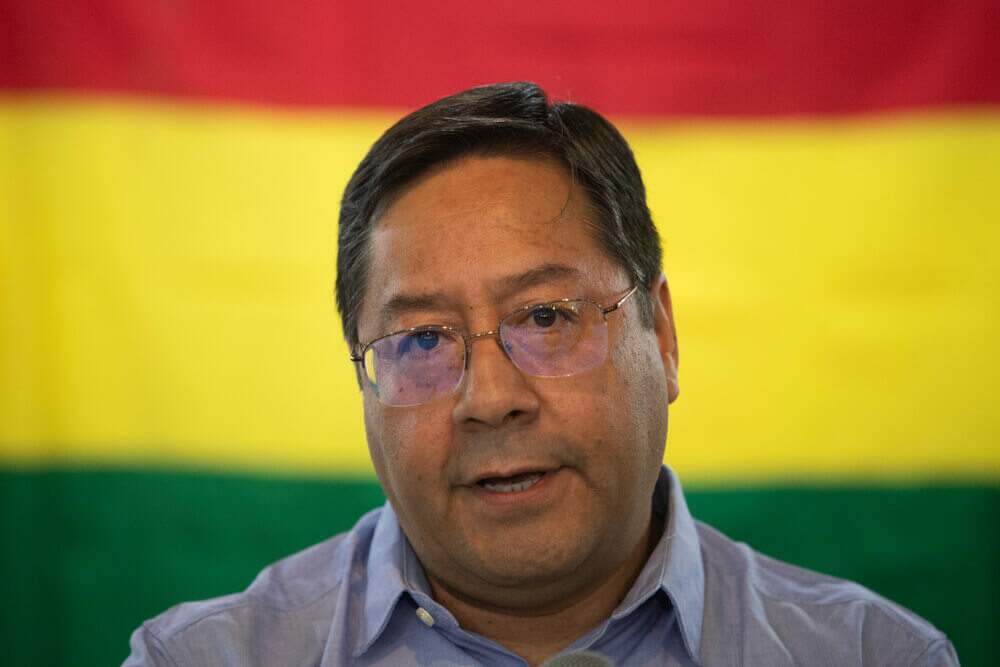RIO DE JANEIRO, BRAZIL – The President of Bolivia, Luis Arce, completed this Monday (8) a year at the head of the Executive Branch, an administration that began with the objectives of reactivating an economy hit by the pandemic, advancing in the vaccination campaign and, mainly, to channel politically and constitutionally a country that from November 2019 to the same month of 2020 was the last Latin American nation to have a de facto government.
“We will govern with responsibility and inclusion facing the changes so that Bolivia returns to the path of stability in the shortest time. We will overcome the pandemic and triumph over the crisis because we are a fighting people,” Arce said as he was sworn in before the Plurinational Legislative Assembly in a conciliatory speech in which he did not mention his political godfather Evo Morales, the head of the Movement Towards Socialism (MAS) party who had been ousted as president just over a year ago.
Read also: Check out our coverage on Bolivia
However, the 58-year-old Bolivian president criticized the previous 12 months in which opposition leader – now-imprisoned – Jeanine Áñez ruled the country de facto, a period that plunged the nation into an institutional crisis that had peaks of violence such as the massacre of 38 people protesting in the cities of Senkata and Sacaba, following the events on November 10, 2019.

“We are going to recover the levels of growth that the de facto Government shattered, and we will do so by reducing poverty and economic and social inequalities,” remarked Arce at the beginning of his Presidency after obtaining 55.1% of the votes.
The measures promoted by the Government since November 8, 2020, were framed “in a statist model that bets on state-owned companies such as telecommunications, the national airline, and Yacimientos Petrolíferos Fiscales Bolivianos (YPFB),” explained Bolivian political analyst Fernando Molina in an interview with Télam.
“The economic model promoted by Arce is the same of Morales because he was the one who commanded and planned it,” added Molina about a period that he considers “one of the most brilliant moments of the Bolivian economy in its entire history” of which Arce, between 2006 and 2019, was Minister of Economy on two occasions.
When he took office as president, after a year of de facto government of Áñez that coexisted with the worst stage of the Covid-19 pandemic, unemployment reached 11.6%, the highest in the last 50 years. At the beginning of October, after 11 months in office, the MAS government announced that it had lowered this rate to 6.5%.
In addition to reducing unemployment, the ruling party highlights the progress made in the anti-virus vaccination campaign: according to the Bolivian Ministry of Health, 63.8% of the population has already been vaccinated with at least one dose.
Another of the government’s first measures was the injection of money through the “Bono contra el hambre” [Anti-Hunger bonus] to alleviate the consequences of coronavirus’s first and second wave in 2020 and part of 2021.
“Each person over 18 years of age has been given 1,000 bolivianos (almost 145 dollars) so that they can reactivate their family economy, this has been one of the first policies that Arce has introduced”, said Beymar Acuña, former head of the Single Confederation of Bolivian Peasant Workers, in an interview with Télam.
The peasant leader considers that during the de facto period of Añez, “several strategic companies such as Entel, Lotum, Eléctrica Central Bulo Bulo, and Boliviana de Aviación have been looted and privatized”, but that the current government “will improve the economy by reactivating these strategic companies” with the objective of “having a 4% economic growth in GDP by the end of the year.”
Even though the government announced two months ago “a trade surplus of US$ 832 million, the highest in seven years”, Bolivia is in an economic crisis aggravated by, among other things, a fiscal deficit of more than 8% of GDP carried over the last six years.
To this was added Arce’s decision to repay a loan from the International Monetary Fund for US$ 327 million, which had been requested and signed by Áñez.
“He has done so as a fulfillment of an electoral promise since MAS considers it as a credit contrary to national sovereignty. This has further weakened the external situation of the economy, which suffers from a lack of foreign currency reserves,” explained Molina.
Even though former President Morales also boasted of having led Bolivia on a path of development without the help of the IMF, during his Presidency, “there was a certain alliance between the Bolivian bourgeoisie and Morales, which has been broken with what happened in 2019”, highlighted the political analyst and mentioned the tax on large fortunes as another measure of Arce that brought “headaches to Bolivian businessmen”.
However, there is also a series of unsatisfied demands within the social organizations belonging to the ruling MAS party, who ask for more significant State interference to compensate for a certain lack of opportunities offered by the economy.
“Several plans have been paralyzed. Next year these support programs for social sectors have to be opened, as is the very worrying issue of water”, said Acuña about an input that would reach 63.4% of the population with basic sanitation by the end of the year as projected by the Government in April.
Along with the pending requests and the rifts within MAS caused by last year’s candidacies, criticisms of the new ranks of the ruling party also appeared, creating both internal tensions and complaints from the opposition.
“The militancy in the MAS has become more opportunistic, from the old guard trained by the struggle before neoliberalism, new figures have appeared who do not have many political merits but are interested in operating to take advantage,” criticized Molina.

